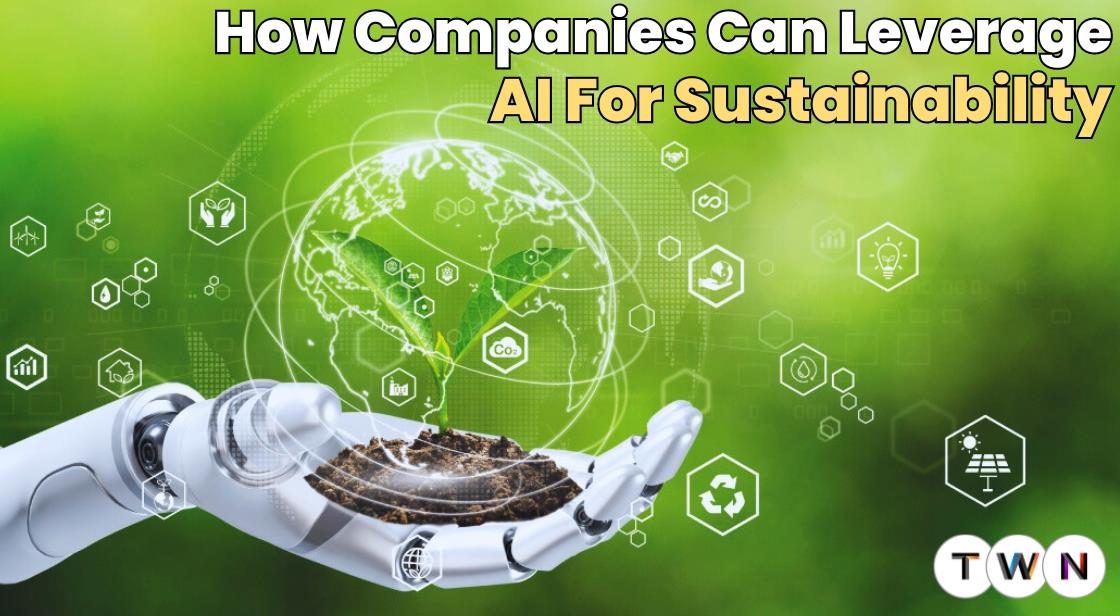How Companies Can Leverage AI for Sustainability

Blog Post
In the evolving landscape of business and environmental stewardship, the integration of Artificial Intelligence (AI) into sustainability strategies has emerged as a transformative force. AI, with its capacity to simulate human intelligence and learn from vast datasets, presents unprecedented opportunities to address some of the most pressing sustainability challenges facing companies today.
As businesses grapple with the imperative to reduce their environmental impact while maintaining profitability, AI offers powerful tools for optimizing operations, managing resources efficiently, and driving innovative solutions.
Sustainability, the practice of meeting current needs without compromising future generations' ability to meet theirs, requires a multifaceted approach. Companies are increasingly recognizing that leveraging AI can be a game-changer in achieving their sustainability goals.
By harnessing AI technologies such as machine learning, predictive analytics, and smart systems, businesses can enhance their resource management, reduce energy consumption, and minimize waste. This not only helps in meeting regulatory requirements but also provides a competitive edge in a market that values environmental responsibility.
In this blog, we will explore how integrating AI into sustainability practices can lead to significant improvements in operational efficiency, decision-making, and regulatory compliance.
We will delve into the definition and scope of AI, examine key sustainability challenges, and highlight practical applications of AI in energy efficiency, resource management, emissions monitoring, and waste reduction.
Through real-world case studies and an examination of future trends, we will illustrate how AI is shaping the future of sustainable business practices and driving a greener, more responsible corporate landscape.
Integrating AI Strategies for Sustainable Business Practices
Overview of AI and Sustainability
Artificial Intelligence (AI) refers to the simulation of human intelligence in machines that are programmed to think, learn, and make decisions like a human. It encompasses various technologies such as machine learning, natural language processing, and robotics. Sustainability, on the other hand, focuses on meeting the needs of the present without compromising the ability of future generations to meet their own needs. It involves practices aimed at reducing environmental impact, conserving resources, and promoting economic and social well-being.
Importance of AI in Sustainability
Integrating AI into sustainability strategies has become increasingly vital for businesses as they face growing environmental and regulatory pressures. AI offers powerful tools for analyzing vast amounts of data, optimizing processes, and predicting outcomes, which are crucial for addressing complex sustainability challenges.
By leveraging AI, companies can enhance their efficiency in resource management, reduce energy consumption, and minimize waste. For instance, AI can predict equipment failures, allowing for timely maintenance and reducing downtime. Additionally, AI-driven analytics can optimize supply chains to reduce carbon footprints.
Incorporating AI into sustainability initiatives not only helps companies meet regulatory requirements and reduce costs but also provides a competitive edge in a market that values corporate responsibility. As businesses seek innovative ways to balance profitability with environmental stewardship, AI emerges as a key enabler in advancing their sustainability goals and achieving long-term success.
Understanding AI in the Context of Sustainability
Definition and Scope of AI
Definition of Artificial Intelligence (AI)
Refers to the simulation of human intelligence processes by machines, particularly computer systems. These processes include learning (the ability to improve performance based on experience), reasoning (the ability to make decisions based on data), and self-correction.
AI encompasses a range of technologies such as machine learning, where algorithms are trained to recognize patterns and make predictions, and natural language processing, which enables machines to understand and respond to human language. AI applications are diverse and include automated decision-making, predictive analytics, and process optimization across various industries.
Scope of AI
Extends to numerous domains, including healthcare, finance, and manufacturing. In the context of sustainability, AI is particularly valuable for optimizing operations, managing resources efficiently, and reducing environmental impact. For example, AI can enhance energy management systems, predict maintenance needs for machinery, and improve supply chain logistics to minimize waste. By leveraging AI technologies, companies can achieve significant improvements in efficiency and sustainability.
Key Sustainability Challenges
Resource Management: Companies face challenges in managing natural resources like water and raw materials. Efficient resource management is crucial to reducing waste and ensuring long-term availability. AI can help by predicting usage patterns, optimizing resource allocation, and identifying inefficiencies.
Emissions Reduction: Reducing greenhouse gas emissions is a critical goal for companies aiming to combat climate change. AI can assist in monitoring emissions in real-time, predicting future trends, and identifying areas for improvement in energy consumption and process emissions.
Waste Management: Effective waste management involves reducing, recycling, and reusing materials to minimize environmental impact. AI can improve waste sorting processes, optimize recycling operations, and provide insights into waste generation patterns, helping companies achieve better waste management practices.
Also Read: Top AI Innovations Transforming Agriculture in 2024: The Future of Farming is Here
AI Applications in Sustainability
Energy Efficiency
AI significantly enhances energy efficiency across various sectors. In industrial processes and buildings, AI algorithms can analyze vast amounts of data to optimize energy consumption. For example, predictive maintenance uses AI to forecast equipment failures before they occur, minimizing downtime and energy waste. Additionally, AI-driven energy management systems adjust heating, cooling, and lighting based on real-time occupancy and environmental conditions, leading to substantial reductions in energy use and costs.
Resource Management
AI plays a crucial role in efficient resource management. In water usage, AI models predict demand and optimize distribution, reducing waste and ensuring availability. In material sourcing, AI helps in identifying sustainable suppliers and optimizing the supply chain to minimize environmental impact. AI-powered tools can also monitor and manage resource consumption in real time, leading to more responsible and efficient use of natural resources.
Emissions Monitoring
AI is instrumental in tracking and reducing greenhouse gas emissions. Real-time monitoring systems powered by AI analyze emission data from various sources, providing insights into emission patterns and sources. Predictive analytics enable companies to anticipate potential issues and implement measures to reduce emissions proactively. AI can also simulate different scenarios to identify the most effective strategies for emission reduction, supporting compliance with environmental regulations.
Waste Reduction
In waste management, AI technologies streamline processes to reduce waste. Recycling automation uses AI to sort and process recyclable materials more effectively, improving recycling rates and reducing landfill waste. Waste sorting technologies powered by AI can accurately separate different types of waste, enhancing the efficiency of recycling operations and minimizing environmental impact.
Case Studies
Company Examples: Provide real-world examples of companies that have successfully implemented AI solutions for sustainability. Detail their approaches, technologies used, and the outcomes achieved.
Example 1: General Electric’s Use of AI for Energy Optimization
General Electric (GE) has leveraged AI to enhance energy efficiency through its Predix platform. This platform uses machine learning algorithms to analyze data from industrial equipment and predict maintenance needs, thus reducing downtime and optimizing energy consumption. GE’s AI-driven approach has led to significant improvements in operational efficiency, enabling companies to lower energy costs and extend equipment lifespan. The implementation of AI technologies has resulted in a reduction of energy consumption by up to 10% in some applications, contributing to more sustainable operations.
Example 2: Unilever’s AI-Driven Resource Management System
Unilever has integrated AI into its resource management strategies to optimize the use of water and raw materials. By using AI-powered analytics, Unilever can monitor and control water usage in real-time, forecast demand, and improve supply chain efficiency. The company's AI system also helps in minimizing waste through better forecasting and resource allocation. As a result, Unilever has achieved a notable reduction in water usage and has improved its overall sustainability performance, reinforcing its commitment to environmental stewardship.
Example 3: Microsoft’s Emissions Reduction through AI Analytics
Microsoft has employed AI to enhance its efforts in reducing greenhouse gas emissions. By using AI-driven analytics, Microsoft tracks its carbon footprint and identifies areas for improvement in energy use and operational practices. The company’s AI tools analyze data from various sources to optimize energy consumption in its data centers and other facilities. This approach has contributed to Microsoft’s goal of becoming carbon negative by 2030, showcasing how AI can play a crucial role in achieving significant emissions reductions and advancing corporate sustainability objectives.
Benefits of Leveraging AI for Sustainability
Operational Efficiency
AI significantly enhances operational efficiency by automating processes and optimizing resource usage. Advanced algorithms analyze vast amounts of data to identify inefficiencies and suggest improvements.
For example, AI can optimize energy consumption in manufacturing by predicting equipment failures and adjusting energy use in real-time, leading to reduced operational costs and minimized environmental impact. AI-driven systems streamline supply chains, reduce waste, and improve overall productivity.
Enhanced Decision-Making
AI empowers companies with data-driven insights that enhance decision-making. Through predictive analytics, AI models forecast future trends, enabling businesses to make informed decisions about resource allocation and sustainability strategies. Machine learning algorithms analyze historical data to predict outcomes and recommend actions, helping companies proactively address potential issues and make strategic choices that align with their sustainability goals.
Regulatory Compliance
AI aids companies in meeting regulatory requirements and sustainability standards by automating compliance monitoring and reporting. AI systems track environmental metrics and generate reports that ensure adherence to regulations. This reduces the risk of non-compliance and associated penalties, while also simplifying the process of meeting complex and evolving regulatory requirements.
Competitive Advantage
Adopting AI-driven sustainability solutions provides companies with a competitive edge by differentiating them in the marketplace. Organizations that leverage AI for sustainability demonstrate innovation and commitment to environmental responsibility, which can enhance their brand reputation and attract eco-conscious consumers. Furthermore, AI-driven efficiencies and insights often lead to cost savings and operational improvements that strengthen a company’s market position.
Challenges and Considerations
Implementation Costs
Integrating AI technologies into sustainability initiatives involves significant financial investment. The costs include purchasing AI tools and software, upgrading existing infrastructure, and ongoing maintenance and support. Initial expenses can be high due to the need for specialized hardware and software, as well as potential customization to meet specific sustainability goals.
However, companies should consider the long-term potential ROI of AI investments. By optimizing resource use, reducing waste, and improving operational efficiency, AI can lead to substantial cost savings and enhanced productivity. Companies often experience a gradual return on investment as they realize operational improvements and cost reductions over time.
Data Privacy and Security
Data privacy and security are critical considerations when implementing AI solutions. AI systems require vast amounts of data to function effectively, which includes sensitive information about operational processes, resource usage, and environmental impact. Ensuring this data is protected from unauthorized access and breaches is essential to maintain trust and comply with regulatory standards. Companies must implement robust cybersecurity measures, including encryption and access controls, to safeguard their data. Additionally, organizations should be transparent about data collection practices and ensure compliance with data protection regulations such as GDPR.
Skill Requirements
Developing and managing AI systems requires specialized skills that are often scarce. Companies need personnel with expertise in machine learning, data science, and AI technologies to design, implement, and maintain these systems. This may involve hiring new talent or upskilling existing employees. Training programs and partnerships with educational institutions can help bridge the skill gap. Investing in these capabilities is crucial for successful AI integration and maximizing the benefits of AI-driven sustainability solutions.
Future Trends in AI and Sustainability
Emerging Technologies
As AI continues to evolve, several emerging technologies promise to enhance sustainability efforts. One significant trend is the advancement of AI-powered smart grids. These grids use AI to optimize energy distribution, reduce waste, and integrate renewable energy sources more efficiently. Another key development is AI-driven precision agriculture, which uses data from sensors and drones to optimize water usage, reduce pesticide application, and improve crop yields sustainably.
Additionally, AI-based circular economy solutions are emerging, focusing on maximizing resource efficiency and minimizing waste through intelligent recycling and waste management systems. Generative AI is also gaining traction, enabling the creation of sustainable materials and products by simulating and optimizing various design parameters.
Long-Term Impact
The long-term impact of AI on global sustainability goals and corporate practices is profound. AI's ability to enhance efficiency and reduce resource consumption will significantly contribute to achieving climate targets and sustainable development goals.
By providing real-time data and predictive analytics, AI can help companies reduce their carbon footprint and improve resource management, leading to more sustainable operations. Furthermore, AI's role in innovating sustainable solutions will drive industries towards greener practices and products, promoting a shift towards a circular economy.
As AI technology becomes more integrated into corporate strategies, it will not only facilitate regulatory compliance but also create new opportunities for sustainable business models and enhance corporate social responsibility. Overall, AI is set to play a crucial role in shaping a more sustainable future, aligning with global efforts to address climate change and environmental degradation.
Conclusion
The integration of Artificial Intelligence (AI) into sustainability strategies marks a pivotal shift in how companies approach environmental stewardship and operational efficiency. AI's ability to process and analyze vast datasets, predict outcomes, and optimize resource use offers transformative potential for addressing some of the most pressing sustainability challenges.
By leveraging AI technologies such as machine learning, predictive analytics, and smart systems, businesses can significantly enhance their energy efficiency, manage resources more effectively, and reduce waste and emissions.
As demonstrated through real-world examples from companies like General Electric, Unilever, and Microsoft, AI has proven to be a valuable tool in advancing sustainability goals. These examples highlight how AI-driven solutions can lead to tangible benefits, including improved operational efficiency, enhanced decision-making, and better regulatory compliance. Moreover, AI provides a competitive edge by aligning business practices with the growing demand for environmental responsibility.
You May Like
EDITOR’S CHOICE












